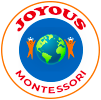Why Choose Us?
JOYOUS MONTESSORI EDUCATION PHILOSOPHY
What Is The Joyous Montessori Education Philosophy?
Here at Joyous Montessori, we are proud practitioners of the Montessori education philosophy and rigorously apply those methods on a daily basis to ensure that your child is getting the support, encouragement, and education they need to grow and be happy!
The Montessori Method of education, founded by Dr. Maria Montessori, is a child-oriented educational framework based on scientific studies of children from the very moment they're born until they reach adulthood.
Dr. Montessori’s system is proven with over a century of continual success across countless cultures all over the globe. At its very core, it's a catalyst that compels young minds to form habits and adopt ways of thinking that will enable them to excel in just about every area of their lives.
It is documented fact that children are naturally eager to learn and are fully capable of engaging their learning capacities in a caring and nurturing environment that's designed to help them reach their full potential.
- The classroom should be clean, well lit, warm, and inviting, filled with plants and animals, art, music and books. Interest centers should be somewhat obvious differentiating the areas of Practical Life, Sensorial, Math, Language, Art, Science, and Geography.
- The classroom should have child sized tables and chairs scattered around the classroom and no teacher desk.
- On observation children will be “working” alone or in small groups.
- Teachers are called “guides” as their main priority is getting to know each child and helping them find interesting materials to learn about at their developmental level. In a Montessori environment, we follow the child’s interests and abilities to want to use the materials, which are like tools for learning in the classroom.
- Children are given “freedom within limits” and are respected as individuals. Discipline is in the form of learning from mistakes with cause and effect reactions and no punishment. Active learning with many positive choices keeps children positively focused and distracted from negative behavior.
- The primary mixed age group allows each child to experience being the youngest, middle and oldest with all the responsibilities and perks of each age. Older children become leaders who “own” the classroom and show the younger ones not only how to behave, but also teach some lessons, as children learn best from one another. If you can teach/show someone else how to do something, you really understand the order, sequence and process (sounds, letters, blending) which leads to a successful product (reading).
- There will be few toys, if any, and the materials on the shelves will involve inquiry, discovery, mastery and continuous feedback due to the “controls of error” and “points of interest” in each material.
- Every child will feel safe; act relaxed and is productively busy making choices and doing materials.
- The focus of the class will be on the children learning, not the teacher teaching.
- Children work should be displayed.
The decision to enroll your child in our school must be based on the mutual decision (yours and the Director’s) that this school is the best fit for your child’s learning style, personality and your family values. Trust your instincts, and use your senses (eyes and ears) to guide your decision as to whether this school is a fit for your family.
Does it show respect for the child, environment, and you? Will you show respect for the school by arriving on time and picking up on time, reading the notes on the door and in e-mails to know what’s happening everyday so you can talk to your child about his/her day. Will you make it a priority to attend conferences, parent information nights and events at school?
If your answer is yes, then a match will be made and your child’s needs can be met round the clock, both at home and in school. This makes for a happy, calm child who loves learning, doing and knowing.
We look forward to talking to you soon and meeting your child’s education and care needs.
